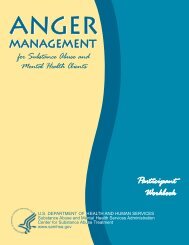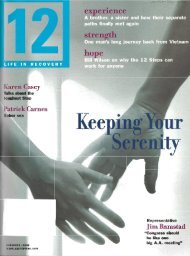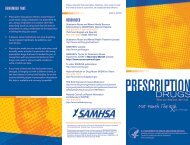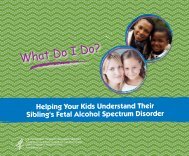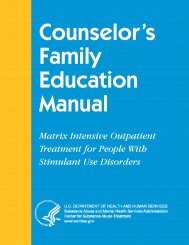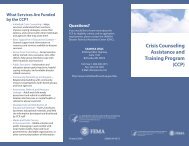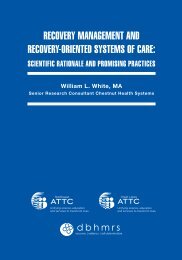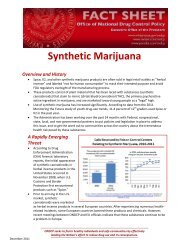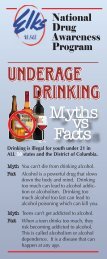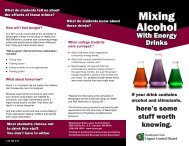Counselor's Manual for Relapse Prevention With Chemically ...
Counselor's Manual for Relapse Prevention With Chemically ...
Counselor's Manual for Relapse Prevention With Chemically ...
Create successful ePaper yourself
Turn your PDF publications into a flip-book with our unique Google optimized e-Paper software.
Instructions. Read the in<strong>for</strong>mation below. Review it when you make out your daily plan <strong>for</strong>recovery.1. Diet: The things you eat and drink can affect the way you think, feel, and act. Sugar, white flour,and caffeine can cause depression, mood swings, and angry feelings. They can cause you to beconfused and make you tired. <strong>Chemically</strong> dependent people should use them only in very smallamounts.You should try to eat three small meals and three snacks per day. You should eat fruit,vegetables, whole grain bread and cereal, meat, and dairy products.2. Vitamins: When you are recovering from chemical dependency, the right kinds of vitamins canimprove the way you think, feel, and act. It is a good idea to take vitamin B complex or a stress<strong>for</strong>mula tablet daily.3. Meetings: Going to AA or NA meetings can help you in recovery more than anything else. It isimportant that you go to as many meetings as possible. The more you are around otherrecovering people, the more your thinking will change.4. Exercise: Aerobic exercise <strong>for</strong> a half hour each day will help your body to recover from thedamage done by alcohol and drugs. Examples of aerobic exercise are fast walking, running,swimming, cycling, and rowing. These activities make your heart beat faster and your lungs workbetter. You do not need to work out until you're exhausted. Aerobic exercise is different fromlifting weights or other body building exercises.5. Relaxation: By learning how to relax, you can get back in control when you begin feeling "crazy."The easiest way to relax is to follow this three-step process:A. Breathe in and out through your nose.B. Feel your lungs fill up with air when you breathe in and feel them empty when youbreathe out.C. Gradually slow down your breathing to a slow, regular rhythm. Practice this deep,relaxed breathing several times a day. The more you practice, the better it will workwhen you need it.6. Rest: You will feel better if you have a set time to go to bed at night and a set time to get up inthe morning. Regular rest helps you recover from the damage that alcohol or drugs have doneto your body and mind. It also helps you think more clearly.7. Work on Other Problems: Make it a goal each day to work on other things besides recovery.These things may be getting a job, finding a place to live, or paying off debts. If you are workingat making progress, even in small ways, you will feel better about yourself.8. Sponsor: Get a sponsor through AA or NA and talk to that person face to face, or on the phone,at least once each day. It helps to have someone to talk to who knows what you are goingthrough. Your sponsor can give you advice and hope.9. Daily Plan and Inventory: You can increase your chances of recovery if you fill out and use yourdaily recovery plan and inventory sheets.10. Review <strong>Relapse</strong> <strong>Prevention</strong> Strategies: By reading your relapse prevention strategies fromExercise No. 25 every day, you will be more aware of your high-risk situations and relapsewarning signs. This awareness will help you avoid trouble be<strong>for</strong>e it gets out of hand.Daily Recovery Plan Sheet



